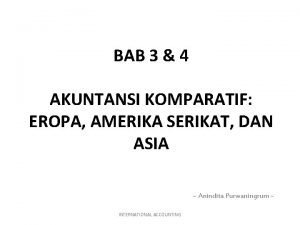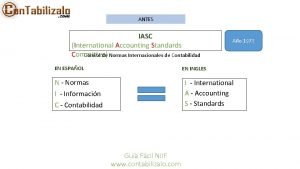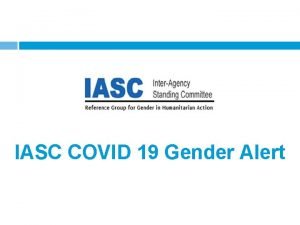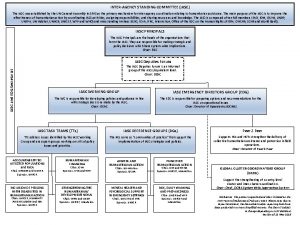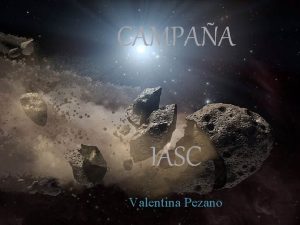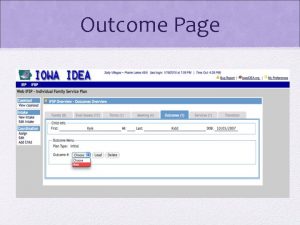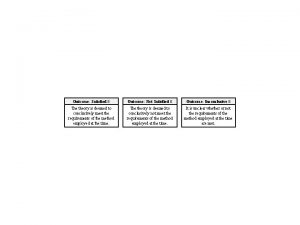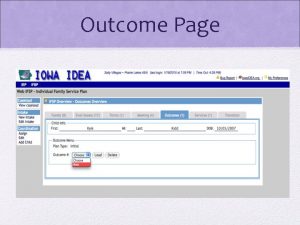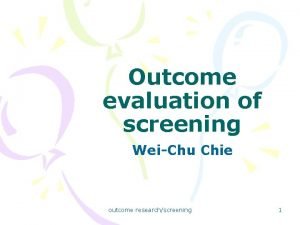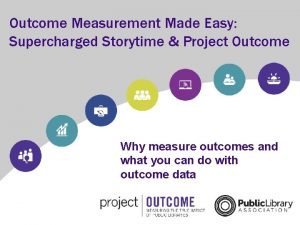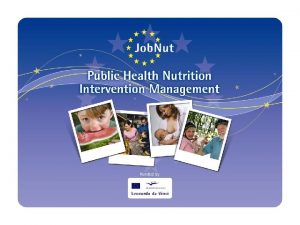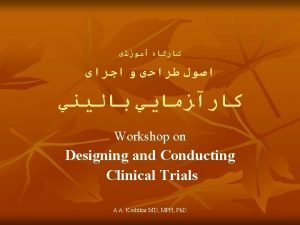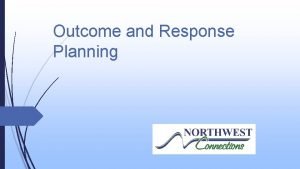IASC Outcome of the IASC 64 th WG

















- Slides: 17

IASC Outcome of the IASC 64 th WG Meeting (14 -16 March 2006) By Yvette Stevens, Assistant Emergency Relief Coordinator and Chairperson of the IASC WG 10 April 2006 HLWG Meeting DD/MM/YYYY Inter-Agency Standing Committee (IASC) Slide 1

Rich, Thematic Agenda IASC § Humanitarian Reform Agenda – CERF – Cluster Approach – Strengthening the Humanitarian Coordinators’ System § Standing Items – CAP – Early Warning and Early Action § Others – Avian and Human Influenza (AHI) – ECOSOC 2006 Humanitarian Segment – IASC Country Teams and NGO Representation/Strategic Dialogue between the IASC and NGOs – Darfur Real Time Evaluation (RTE) – Humanitarian Security – Preparations for the IASC Principals Meeting – AOB DD/MM/YYYY 2

Humanitarian Reform: CERF IASC § Launch of CERF, 9 March 2006 – Appreciated commitments made by donors, especially to the “additionality” of the CERF funds. – Noted on the proposed CERF Advisory Group – Recommended that: (a) criteria for the selection of the four independent experts of the Advisory Group should include knowledge of transition issues and reflect both UN and non UN experience, and (ii) to consider whether a disbursement of funds forgotten emergencies would be possible before July 2006. DD/MM/YYYY Inter-Agency Standing Committee (IASC) 3

Humanitarian Reform: Clusters Global Issues IASC § Update by IOM and IFRC on their respective role in Camp Coordination and Management (CCCM) and Emergency Shelter in Natural Disasters – Appreciated progress made by IOM and IFRC – Encouraged to broaden partnership with NGOs in the CCCM and Emergency Shelter Clusters § Outstanding Cross Cuttings Issues – Urged to ensure the integration of cross-cutting issues, namely, gender, environment, HIV/AIDS, protection, human rights, and age (including older population) § Information Management Strategy – Recognised the need to strengthen common approaches to the management and exchange of information and on producing quality information and analysis – HIC and NAF to be the starting point to move forward – OCHA to organise the workshop to discuss inter-agency information management DD/MM/YYYY Inter-Agency Standing Committee (IASC) 4

Humanitarian Reform: Clusters Global Issues IASC § Resource Mobilisation – Supported the comprehensive approach of integrating additional resources for the cluster implementation with the existing funding framework. – Funding for new emergencies in the field should be fit into the CAP framework, including Flash Appeals and revision of CAP. – Only strategically essential costs of stockpiling should be incorporated in the Cluster Appeal 2006. – Agreed to add to the Cluster Appeal 2006 one table showing how much money each agency needs. – CAP SWG is examining how to standardise integration of the cluster approach into CAP. – Mid Year Review (MYR) of the Cluster Appeal 2006 and Consolidated Appeals will provide opportunities for review. DD/MM/YYYY Inter-Agency Standing Committee (IASC) 5

Humanitarian Reform: Clusters Field Issues IASC § Cluster Implementation in DRC, Uganda and Liberia – Reviewed some common emerging issues from the cluster implementation in three countries: (a) Distinguishing between the cluster approach and sectoral coordination; (b) Observation on early recovery and protection clusters; and (c) Role of the IASC – Stressed importance of a field-driven process and agreed on the importance of including all IASC agencies in developing the cluster approach also at field level. – Agreed on the importance of developing measurable indicators in assessing the impact of the cluster approach. § Pakistan Real Time Evaluation (RTE) – Noted that the Cluster Approach provided a single and recognisable framework for coordination, collaboration, decision-making and practical solutions in a chaotic operational environment. – Remaining challenges include: (a) need for clearer roles and responsibilities on the cluster implementation; (b) need to separate cluster responsibilities from agency mandated functions; and (c) need to ensure integration of cross-cuttings issues DD/MM/YYYY Inter-Agency Standing Committee (IASC) 6

Humanitarian Reform: Clusters Field Issues IASC § Potential Field Roll-Out – Recommended for incremental, cautious approach based on reviews of lessons learned of existing implementation. – Broadly supported that the cluster approach could be recommended for Somalia, given that a cluster model is already in place there. – Recommended to field IASC missions to Nepal and Colombia, pending consultation with respective HCs and Country Teams. § Field Guidance Note – Established the IASC Task Team, led by OCHA to develop a field guidance note on the clusters based on: (a) The Generic To. R for the Cluster Leads at the Country Level; (b) Questions and Answers on the Clusters – IASC Principals will review and endorse the draft Guidance Note DD/MM/YYYY Inter-Agency Standing Committee (IASC) 7

Humanitarian Reform: Strengthening the Humanitarian Coordinator’s System IASC § Actions and next steps – Draft Action Plan for Strengthening the HC System and draft procedures to establish the HC Pool were approved with some amendments. – Issues raised including: (a) RC/HC relationship and (b) Need to develop criteria and circumstances based on which a separate RC/HC could be considered. – Agreed to establish a dedicated group working on Humanitarian Coordinator Issues Group (HCIG) to finalise the Action Plan and to facilitate the IASC implementation of the long term strategy. DD/MM/YYYY Inter-Agency Standing Committee (IASC) 8

CAP Director’s Review / Mid-year Review / Programme Update IASC § Director’s Review of the o. Pt (occupied Palestinian territory) CAP 2006 – Successful development of the CAP in o. Pt, particularly due to an effective Country Team, effective analysis component in OCHA and existence of effective coordination mechanisms – Needs Analysis Framework (NAF) proved to be useful framework for analysis and examination of changing needs – Noted improved engagement of NGOs in the CAP and CHAP – Listing of main NGO activities in the CAP should be replicated in other appeals to ensure strong link between overall strategy and project activities § IASC Principals Participation in the Mid-Year Review (18 July 2006) and September Programme Update of the CAP (Date: tbc) – Follow-up events to the 2006 to the CAP Programme Kick-off, 12 January 2006 – Agreed to nominate the High Commissioner for Human Rights to head the Mid-Year Review (July 2006) and the Executive Director of UNICEF for the Programme Update DD/MM/YYYY Inter-Agency Standing Committee (IASC) 9

Early Warning - Early Action IASC § IASC Sub-Working Group on Preparedness and Contingency Planning – EW-EA report (March-June 2006) highlighted particular concerns for the period. Examples include Eritrea, o. Pt, Darfur, Chad, DRC, Kosovo and Uzbekistan – The SWG to define follow-up actions specifically for the IASC WG (such as advocacy and resource mobilisation) – SWG to include more non-UN actors – Need for Early Warning to be translated effectively into Early Action – SWG to submit recommendations on concrete steps to be taken in the most critical and deteriorating countries and regions DD/MM/YYYY Inter-Agency Standing Committee (IASC) 10

Avian Flu and Human Influenza Humanitarian Action IASC § Agency preparedness and activities – Agreed that the subject of AHI and humanitarian action deserves focused attention, as there is a humanitarian dimension that needs to be addressed urgently. – Priority areas of IASC engagement include: (a) Review of operational mandates and internal preparedness measures; (b) Stockpiling; (c) Linkage with national plans; and (d) Resource mobilisation. – Humanitarian agencies will likely have to expand activities to support to individual and communities not traditionally in contact with humanitarian actors. – IASC WG will remain seized of the issue, and the issue will be discussed at the upcoming Principals meeting. DD/MM/YYYY Inter-Agency Standing Committee (IASC) 11

ECOSOC 2006 Humanitarian Segment (14 -19 July 2006) IASC § Theme – Noted theme for the Segment “Strengthening of the co-ordination of UN humanitarian assistance” and sub-themes “Addressing gender-based violence in humanitarian crises” and “Addressing chronically under-funded crises” § Reports – Noted that four reports will be drafted in consultative manner for submission: DD/MM/YYYY • Report of the Secretary-General on the strengthening of the coordination of emergency humanitarian assistance of the United Nations (including an update on the Central Emergency Response Fund). • Report of the Secretary-General on strengthening emergency relief, rehabilitation, reconstruction and prevention in the aftermath of the South Asian Earthquake disaster – Pakistan • Report of the Secretary-General on Humanitarian assistance and rehabilitation for El Salvador and Guatemala • Report of the Secretary-General on the strengthening of emergency relief, rehabilitation, reconstruction and prevention in the aftermath of the Indian Ocean tsunami disaster Inter-Agency Standing Committee (IASC) 12

IASC Country Teams and NGO Representation and Strategic Dialogue between the IASC and the NGOs IASC § IASC Country Teams and NGO Representation (by ICVA) – Key issues: (a) Accountability of NGOs vis-à-vis IASC CTs; (b) Membership of IASC CT; and (c) Relationship between the IASC CTs and UN CTs. – Agreed that the composition of IASC CT should be flexible so as not to needlessly exclude key non IASC-partners. – Lack of knowledge about the IASC amongst both NGOs and UN in the field remains challenge. Agreement on the need for guidance on the establishment of IASC CTs. § Strategic Dialogue between the IASC and the NGOs (by SCHR) – Endorsed proposals outlined in the discussion Paper on Strengthening NGOs participation including: (a) using NGO fora more effectively, (b) strengthening participation of IASC in regular NGO meetings, and (c) increase IASC’s visibility in NGO publications. – A meeting will be held on 13 July 2006 (at the margin of ECOSOC) between the CEOs of NGOs and the IASC Principals, which will focus on strategic policy issues and better humanitarian response. DD/MM/YYYY Inter-Agency Standing Committee (IASC) 13

Darfur Real Time Evaluation (RTE) Follow-Up IASC § Recommendations and Concerns in Darfur – Critical importance of addressing gender based violence and protection. – Other general concerns include: a) lack of access; b) wide-spread human rights violations; c) food security; and d) a lack government cooperation. – Need for shared analysis and common framework among humanitarian actors as well as better beneficiary involvement. – Quality of the humanitarian staff was a major concern – something which had a general impact on the response in the early stages of the operation. – Improvements in staffing are subject to availability of financial resources. § The Use of Real Time Evaluations (RTEs) – RTEs recognised as useful experience and good tool to improve management – especially if implemented from the outset of the operation. DD/MM/YYYY Inter-Agency Standing Committee (IASC) 14

Humanitarian Security IASC § The Report “Savings Life Together - A Framework for Improving Security Arrangements” – The Report was prepared by the IASC Task Force on Collaborative Approaches to Field Security. – The main recommendation of the Report is the dissemination and use of the Menu of Options for UN/NGO/IGO Security Collaboration approved by the IASC in 2001. – It was agreed that the Inter-Agency Security Management Network (IASMN) should discuss and approve the Report prior to IASC endorsement. – Agreed to review the report at the next 65 th IASC WG meeting in July 2006. DD/MM/YYYY Inter-Agency Standing Committee (IASC) 15

IASC Principals Meeting, 24 April 2006 Preparations IASC § Agenda of the Meeting will include: – Implementation of Humanitarian Reform Initiative – Strengthening NGO Engagement and Participation in IASC – Priorities of the United Nations Department of Safety and Security – Challenge of Avian and Human Influenza § Agenda and relevant background documents will be available in the IASC website (www. humanitarianinfo. org/iasc) DD/MM/YYYY Inter-Agency Standing Committee (IASC) 16

AOB IASC § Integrated Missions – The issue of Integrated Mission will be discussed at upcoming 65 th IASC WG meeting. § Venue of the 66 th IASC WG Meeting – 66 th IASC WG Meeting (November 2006) will be held in DRC with an agenda relevant for the Country. § Review of the SOP of the IASC – The Standard Operating Procedures (SOPs) of the IASC (originally distributed in March 2005) will be updated. DD/MM/YYYY Inter-Agency Standing Committee (IASC) 17
 Akuntansi komparatif eropa
Akuntansi komparatif eropa T-iasc ildathach marcus pfister
T-iasc ildathach marcus pfister Iasc aneel
Iasc aneel Contabilizalo.com
Contabilizalo.com Trời xanh đây là của chúng ta thể thơ
Trời xanh đây là của chúng ta thể thơ Thiếu nhi thế giới liên hoan
Thiếu nhi thế giới liên hoan điện thế nghỉ
điện thế nghỉ Cong thức tính động năng
Cong thức tính động năng đặc điểm cơ thể của người tối cổ
đặc điểm cơ thể của người tối cổ Tỉ lệ cơ thể trẻ em
Tỉ lệ cơ thể trẻ em Các châu lục và đại dương trên thế giới
Các châu lục và đại dương trên thế giới Sơ đồ cơ thể người
Sơ đồ cơ thể người So nguyen to
So nguyen to Kể tên các môn thể thao
Kể tên các môn thể thao Cái miệng xinh xinh thế chỉ nói điều hay thôi
Cái miệng xinh xinh thế chỉ nói điều hay thôi Hát kết hợp bộ gõ cơ thể
Hát kết hợp bộ gõ cơ thể Cách giải mật thư tọa độ
Cách giải mật thư tọa độ ưu thế lai là gì
ưu thế lai là gì
